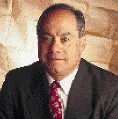From the Director
A Word from Our Executive Director
Introducing the Open Group

Probably the most important news to come out of UniForum '96 was the announcement
of the consolidation of Open Software Foundation (OSF) and X/Open Co. Ltd.
into a new entity called the Open Group. This combined organization is great
news for users of open systems.
The collaboration of these two major open systems organizations finally
achieves the goal of a unified user group for the advancement of open technologies.
Now much work will be required of the Open Group to satisfy user demands
and to answer the skeptics who have rightly pointed to so many unification
failures over the years. At UniForum, we are encouraged by this new venture,
we support its goals enthusiastically, and we'll be cooperating with the
Open Group in programs that I'll report on in future editorials. Next month,
we'll introduce a new regular column that will cover the technical efforts
of the group.
The driving reason behind the creation of the Open Group is clear. There
is an unacceptable delay in getting product to market, and with the open
systems marketplace growing at a rate more than double that of the enterprise
computing industry as a whole, the Open Group can play no more beneficial
role than to fuel this rapid growth by enabling technologies that meet market
demands. Better time to market can be measured in reduced cost to the customer,
and the Open Group will set this as a measure of its success.
High on the group's priority list are focus areas, which will see significant
action with regard to new product standards and technologies in 1996. These
focus areas will be security; distributed systems management; the Internet
and World Wide Web; systems architecture; and interoperability.
The establishment of the Open Group has the immediate effect of creating
the largest, most influential assembly of open systems users (outside of
UniForum itself). The OSF End-User Forum and X/Open's Users Council will
merge to become the Open Group Customer Council (OGCC). The OGCC will bring
user input directly to the Open Group for its work on standardization, new
technologies and product development, and it will kick off its work with
an organizing meeting this month in San Francisco. More than 235 companies,
research institutions and government agencies from around the world comprise
the OGCC--a virtual Who's Who of the most prominent users of open systems
today. These are the guiding lights whose demands for open systems have
driven our industry for 25 years.
Another immediate benefit of this collaboration is the good news that OGCC
members will become members of UniForum, thus increasing our membership
rolls by several thousand and giving UniForum an even fuller audience for
our own user-oriented publications, education and training.
The Open Group will be led by a new CEO, who had not been named as we went
to press. This individual will also become the new president and CEO of
OSF, following the tenure of interim CEO Jim Bell who, of course, is a UniForum
board member and past president. Jim's leadership has gone a long way toward
making the Open Group a reality, and its creation is a fitting tribute to
his efforts. This was just one reason he was selected to receive the UniForum
Achievement Award at the opening day keynote of UniForum '96. The UniForum
family and the open systems community owe Jim a debt of gratitude. I'm sure
his contributions to the industry will continue for many years.
Richard H. Jaross is the executive director of the UniForum
Association. He can be reached at rich@uniforum.org.
